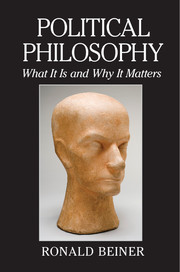Crossref Citations
This Book has been
cited by the following publications. This list is generated based on data provided by Crossref.
Keat, Russell
2016.
Philosophy and Political Engagement.
p.
117.
Knapp, Stan J.
2016.
Reconstructing Social Theory, History and Practice.
Vol. 35,
Issue. ,
p.
145.
Dinan, Matthew
2017.
The Robot Condition: Karel Čapek'sR.U.R.and Hannah Arendt on Labor, Technology, and Innovation.
Perspectives on Political Science,
Vol. 46,
Issue. 2,
p.
108.
MacKay, Joseph
and
LaRoche, Christopher David
2017.
The conduct of history in International Relations: rethinking philosophy of history in IR theory.
International Theory,
Vol. 9,
Issue. 2,
p.
203.
Kontos, Pavlos
2017.
Phenomenology and the Primacy of the Political.
Vol. 89,
Issue. ,
p.
233.
Alexander, James
2019.
A genealogy of political theory: a polemic.
Contemporary Political Theory,
Vol. 18,
Issue. 3,
p.
402.
Hiruta, Kei
2019.
Arendt on Freedom, Liberation, and Revolution.
p.
1.
Pinkoski, Nathan J.
2020.
Alasdair MacIntyre and Leo Strauss on the Activity of Philosophy.
The Review of Politics,
Vol. 82,
Issue. 1,
p.
97.
Starkey, Ken
Holstein, Jeannie
and
Tempest, Sue
2021.
Xenophobia, the Unconscious, the Public Sphere and Brexit.
European Management Review,
Vol. 18,
Issue. 1,
p.
25.
Hiruta, Kei
2023.
Methodology, comparison and humanity: a reply to Otobe, Futai and Yamaoka.
Japanese Journal of Political Science,
Vol. 24,
Issue. 4,
p.
438.
ORUÇ, Derya
2024.
A promise of ‘The Good Place’: Dystopia in Kate Wilhelm’s The Funeral and Kazuo Ishiguro’s Never Let Me Go..
RumeliDE Dil ve Edebiyat Araştırmaları Dergisi,
p.
1431.





